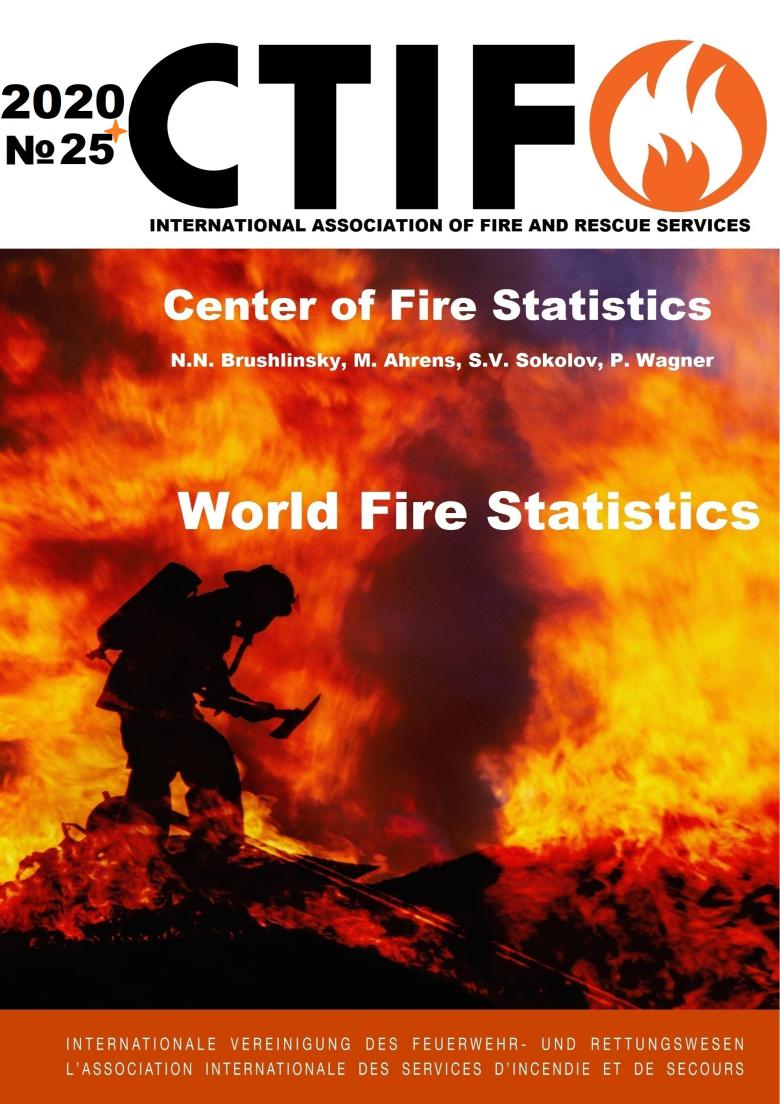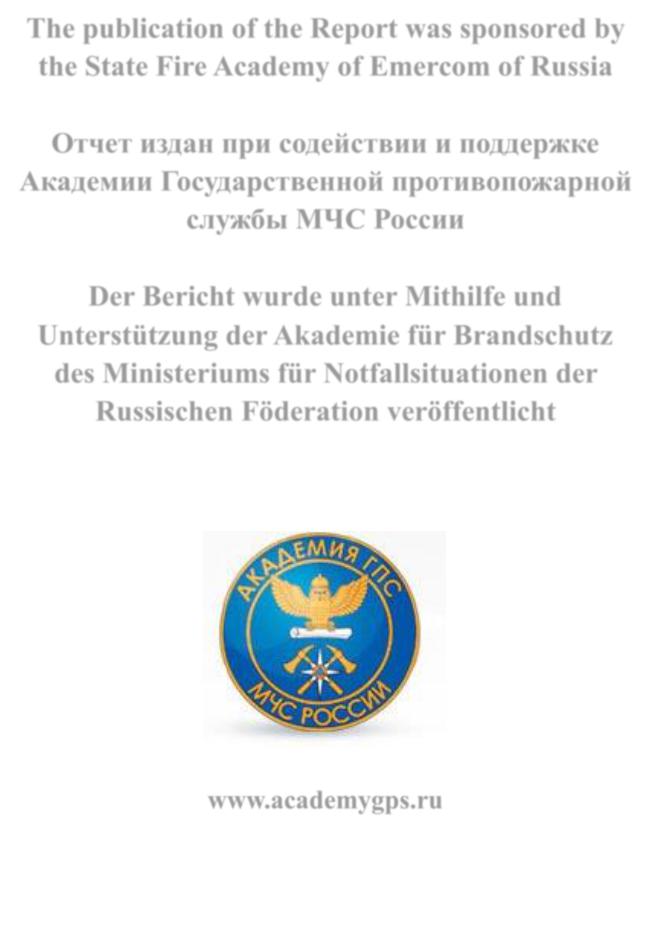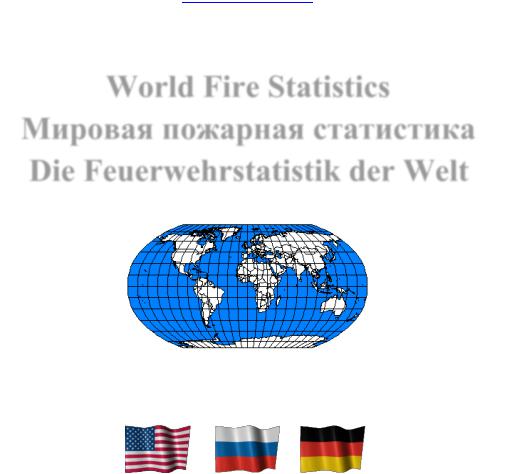
Статистика пожаров / Центр пожарной статистики CTIF / ctif_report25_world_fire_statistics_2020
.pdf

The publication of the Report was sponsored by the State Fire Academy of Emercom of Russia
Отчет издан при содействии и поддержке Академии Государственной противопожарной службы МЧС России
Der Bericht wurde unter Mithilfe und Unterstützung der Akademie für Brandschutz des Ministeriums für Notfallsituationen der Russischen Föderation veröffentlicht
www.academygps.ru
_____________________________________________________________________________________________
© Copyright by Center for Fire Statistics of CTIF 2020

International Association of Fire and Rescue Services
МеждународнаяАссоциацияПожарно-спасательныхСлужб
Internationale Vereinigung des Feuerwehrund Rettungswesens
CTIF
WWW.CTIF.ORG
Center for Fire Statistics
World Fire Statistics
Мировая пожарная статистика
Die Feuerwehrstatistik der Welt
Report / Отчет / Bericht № 25
National committees CTIF of Russia, Germany, USA
Prof. Dr. Nikolai Brushlinsky (Chief)
(Academy of State Fire Service, Russia)
Marty Ahrens (Vice Chief)
(National Fire Protection Association, USA)
Prof. Dr. Sergei Sokolov (Vice Chief)
(Academy of State Fire Service, Russia)
Dr. Ing. Peter Wagner (Vice Chief)
(Berlin Fire and Rescue Academy, GFPA, Germany)
_____________________________________________________________________________________________
© Copyright by Center for Fire Statistics of CTIF 2020

All statistical data presented in the report were obtained from responses to the requests of the Fire Statistics Center and published previously in official statistical reports of various countries.
The data of past years has, in some cases, been updated with revised information.
When comparing statistics of countries and cities, it is necessary to keep in mind that every country has its own rules for reporting fires, fire deaths, and fire injures. These rules change from time to time.
The authors are always grateful for any suggestions to improve the work of the Center for Fire Statistics.
Все статистические данные, представленные в отчетaх, получены из ответов на запросы Центра пожарной статистики, а так же из опубликованных официальных статистических отчетов различных стран. Данные прошлых лет корректируются в соответствии с уточнением информации.
При сравнении статистических данных по странам и городам необходимо иметь в виду, что каждая страна имеет свои правила регистрации пожаров, погибших и травмированных на пожарах, которые в свою очередь так же меняются со временем.
Авторы отчета всегда признательны за любые предложения, направленные на улучшение работы Центра Пожарной Статистики.
Alle im Bericht vorgestellten statistischen Daten wurden den Fragebögen des Centre for Fire Statistics sowie den offiziell veröffentlichten statistischen Berichten verschiedener Staaten entnommen. Die Daten vergangener Jahre wurden im Zuge neuerer Informationen aktualisiert.
Beim Vergleich der statistischen Daten einzelner Staaten und verschiedener Jahre muss beachtet werden, dass in einzelnen
Ländern spezifische Regeln für die Erfassung von Bränden, der Brandtotenund Verletztenzahlen gelten, die sich ggf. auch über die Jahre hinweg verändert haben.
Die Autoren sind wie immer für Hinweise, Kritiken und Vorschläge zur Verbesserung der internationalen Feuerwehr Statistik dankbar.
_____________________________________________________________________________________________
© Copyright by Center for Fire Statistics of CTIF 2020
3
Content / Содержание / Inhaltsverzeichnis
Introduction / Введение / Einführung……..……………………………… |
4 |
Brief comments / Краткие комментарии / Kurze Kommentare.................. |
7 |
Conclusion / Заключение / Zusammenfassung…........................................ |
18 |
Sources / Источники / Quellen…................................................................ |
19 |
Tables and Figures / Таблицы и графики / Tabellen und Bilder…………. |
20 |
_____________________________________________________________________________________________
© Copyright by Center for Fire Statistics of CTIF 2020

4
Introduction
The Center of Fire Statistics (CFS) of the International Association of Fire and Rescue Services (CTIF) presents its latest report №25, containing fire statistics of many CTIF countries and their larger cities for 2018 and trends for 2014-2018.
This report includes statistics on numbers and rates of fires, deaths, and injuries due to fires and on-duty firefighter deaths and injuries, whether sustained at fires or not. The report also includes statistics on numbers of non-fire emergency responses, by significant type of incident, and values and rates of firefighters, fire service apparatus and stations.
The fire and loss statistics for 2018 are based on data from 46 countries and 41 cities. Data on calls, fires, and losses during 2014-2018 are from 65 countries that have supplied data for one or more of the five years in 2014-2018. In each table, the number of countries with data shown varies depending on the number of countries that reported data for the displayed statistics at any time in 2014-2018. For 59 countries, statistics on fire service resources are presented.
In table 1, an overview of the fire problem in the World for 1993-2018 is presented. Statistical data for earlier years carried forward unchanged from previous reports, even though countries that join the publication for the first time provide data for older years. In 2018, 46 countries provided data, the largest number since 2002. We see this as a sign that more and more countries are developing national fire statistics and publishing their results in readily accessible documents. On average, 39 countries per year provided data for the report. We hope that the future will see even more countries participating and more countries providing current data. The number of countries included and the total population figures are based on states that have reported to CTIF. Note that participation of countries varies from year to year. That can impact the number of fires and associated losses as well as fire and loss rates.
In 2018, data were reported by roughly one-quarter of the World’s countries, with amore than one-third of the worldwide population.
Tables 2-5 provide an overview of other fire and fire-related statistics in the countries of the World in 2018. Tables 6-10.1 show trends in calls, fires, civilian fire deaths, fire injuries, and firefighter deaths and injuries in the countries of the World for 2014-2018. Table 11 shows numbers and rates of firefighters and fire service apparatus and stations for the fire services of 59 countries in 2001-2018. Table 12 provides the gender breakdown of firefighters, and Table 13 shows the number of young firefighters in some countries.
Tables 2.1-5.1 provide an overview of fire and fire-related statistics in several cities of the World in 2018. Tables 6.1-8.1 show trends in calls, fires and fire deaths in the cities of the World for 2014-2018. Table 11.1 shows numbers and rates of firefighters and fire service apparatus and stations for the fire services in 68 cities for the most recent year of available data.
_____________________________________________________________________________________________
© Copyright by Center for Fire Statistics of CTIF 2020

5
Введение
Центр пожарной статистики Международной ассоциации пожарно-спасательных служб (КТИФ) предлагает вниманию специалистов очередной отчет №25, содержащий пожарную статистику стран и городов мира за 2018 г., а также динамику
вызовов, пожаров, их жертв и гибели пожарных в странах и городах мира за
2014-2018 г.г.
Статистика за 2018 г. содержит данные о 46 странах, которые представляют почти ¼ всех стран мира и 1/3 всего мирового населения и 41 городах мира. Динамика вызовов, пожаров, их жертв и гибель пожарных за 2014-2018 г.г. исследована соответственно в 45, 65, 56 и 28 странах, динамика травмированных на пожарах за 2014-2018 г.г. исследована в 44 странах мира. Кроме того, собраны данные о противопожарных службах в 59 странах мира. Так продолжается формирование мировой пожарной статистики, которая не существовала в ХХ веке.
Вданном отчете таблица 1 содержит обобщенные данные об обстановке с пожарами в мире за 1993-2018 годы, причем данные за все годы постоянно уточняются и дополняются (по мере поступления новых источников информации). Это означает, что все больше стран мира включаются в работу по регулярному анализу национальной пожарной статистики и ее публикации в средствах массовой информации. Мы уверены, что и данные за 2018 год удастся пополнить в будущем.
Втаблицах 2-5 приведена пожарная статистика за 2018 год в ряде стран мира. В таблицах 6-10.1 приводится динамика вызовов, пожаров, их жертв и гибели пожарных в странах мира за 2014-2018 г.г. Таблица 11 содержит информацию о противопожарных службах в 59 странах мира в 2001-2018 г.г. Таблица 12 представляет соотношение женщин и мужчин в пожарной службе некоторых стран мира. Таблица 13 представляет информацию о численности юных пожарных в ряде стран.
Втаблицах 2.1-5.1 приведена пожарная статистика за 2018 год в 40 городах мира. В таблицах 6.1-9.1 приводится динамика пожаров и их жертв в городах мира за 2014-2018 г.г. Таблица 11.1 содержит информацию о противопожарных службах в 68 городах мира.
_____________________________________________________________________________________________
© Copyright by Center for Fire Statistics of CTIF 2020

6
Einführung
Das Zentrum für Feuerwehrstatistik des CTIF stellt der Fachwelt den aktuellen Bericht № 25 vor, der die Feuerwehrstatistik vieler Staaten und Städte für 2018 enthält. Weiter werden Informationen über die
Entwicklung der Einsätze, der Brandzahlen und der Brandopferzahlen in der Welt für 2014-2018 vorgestellt.
Die CTIF-Statistik aus 2018 enthält Daten aus 46 Staaten und 41 Städten. Die Zahlen zur Entwicklung der Einsätze. der Brände, deren Opfer und die Anzahl verunglückter Feuerwehrleute für den Zeitraum 2014-2018 liegen entsprechend aus 45, 65, 56 bzw. 28 Staaten vor. Informationen zu Verletzten stehen aus 44 Staaten zur Verfügung. Weiter wurden die statistischen Angaben zu den Feuerwehren aus 59 Staaten in die Statistik aufgenommen. So setzt sich der Prozess der Formierung der Weltfeuerwehrstatistik, die es im XX. Jahrhundert so noch nicht gab, fort.
Im vorliegenden Bericht stellt die Tabelle 1 die zusammengefassten Daten zur Brandsituation in der Welt für den Zeitraum 1993-2018 vor. Die Daten wurden, je nach Vorliegen neuer Statistiken, ständig ergänzt und aktualisiert. Das bedeutet, dass sich immer mehr Staaten mit der regulären nationalen Brandstatistik und ihrer Veröffentlichung in den Medien beschäftigen. Wir sind sicher, die Daten des Jahres 2018 zukünftig weiter vervollständigen zu können.
In den Tabellen 2 bis 5 wird die Brandstatistik einiger Staaten für 2018 analysiert.
In den Tabellen 6 bis 10.1 wird die Dynamik der Brandzahlen und der
Opferzahlen in den Staaten für den Zeitraum 2014-2018 vorgestellt.
Tabelle 11 illustriert die Situation der Feuerwehren in 59 Staaten der Erde im Zeitraum 2001-2018. Tabelle 12 zeigt eine Übersicht zum Mengenverhältnis zwischen weiblichen und männlichen Feuerwehrangehörigen in ausgewählten Staaten. Tabelle 13 zeigt eine Übersicht zur Anzahl der Jugendfeuerwehren in ausgewählten Staaten.
In den Tabellen 2.1 bis 5.1 wird die Feuerwehrstatistik für 2018 aus 40 Großstädten vorgestellt. Die Tabellen 6.1-9.1 beinhalten die Entwicklung der
Brandzahlen und deren Opfer in Großstädten für 2014-2018. Die Tabelle 11.1 zeigt Informationen über die Feuerwehren in 68 Großstädten der Welt.
_____________________________________________________________________________________________
© Copyright by Center for Fire Statistics of CTIF 2020

7
Brief comments
Table 1 shows 1993-2018 total fire statistics from 27-57 countries, collectively representing 0.9-3.8 billion inhabitants of the Earth, depending on the year of reporting. In these countries, 2.5-4.5 million fires and 17-62 thousand fire deaths were reported to fire
services, depending on the year.
Table 2 shows that in 46 countries, representing 2.7 bln. inhabitants, 36% of the World’s population, 50 million calls (18.1 calls per 1000 inh.), 4,6 million fires (9.2% of all calls, 1.7 fires per 1000 inh.), 30.8 thousand civilian fire deaths (1.1 fire deaths per 100 thous. inh.) and 51.3 thousand civilian fire injuries (1.9 fire injuries per 100 thous. inh.) reported by fire services in 2018.
Average call, fire and civilian fire death rates in 2014-2018 relative to population are presented in fig.1-4.
Table 3 and fig.5 show that in some countries where the fire service provides medical aid, medical aid responses tend to dominate total emergency responses for the country. Five countries show medical assistance calls as more than half of all requests – Singapore, Slovenia, Jordan, France, and the USA. Some of these five countries were at the top of call rates relative to the population. In contrast – Bulgaria shows medical aid calls as less than 1% of total calls. It is likely that in the eight countries where medical aid calls are more than zero but less than half of all calls, the medical aid service is offered by only a fraction of the countries fire service.
Tables 4 and fig. 6 must-reads with caution because of often substantial differences in reporting categories among countries. For example, some countries (primarily European) report chimney fires separately while others (including the USA) report chimney fires as part of structure fires. Some countries (Russia) do not include most wildland (grass and brush) fires. The USA statistics do not include fires handled by federal or state agencies.
Tables 5 and fig. 7 provide some of the same type of rate calculations as table 2 done for structure and vehicle fires only. These results are more likely to support valid comparisons. There may, however, be differences in the severity of fires that were reported to or documented by the fire services. Countries in which monitored fire detection systems are common may have a larger share of smaller fires.
Tables 6-10.1 show trends in calls, fires, civilian fire deaths, civilian fire injuries, firefigthers deaths and firefighters injuries in the countries of the World for 2014-2018.
The mean rate of calls per 1000 inh. per year was 44.0. The mean rate of fire per 1000 inh. per year was 1.1. The mean rate of fire deaths per 100 thous.inh. per year was 4.4.
_____________________________________________________________________________________________
© Copyright by Center for Fire Statistics of CTIF 2020
8
The highest average call rates in 2014-2018 relative to population (tab.6) are found in the USA, Luxemburg, Slovenia, France and Japan. This difference is likely caused by the differing fire service responsibilities, such as medical aid, in each country. (fig.1).
The highest average fire rates relative to population in 2014-2018 (tab.7) are found in Barbados, Suriname, and Israel (fig.2).
The highest average fire death rates relative to population (tab.8) (5.4-6.2 fire deaths per 100 thous. inh.) are found in Belarus, Russia, and Lithuania (fig. 3). The highest average fire death rates per 100 fires in 2014-2018 (tab.8) were found in Belarus, Taiwan, and Nepal (fig. 4).
The highest average fire injury rates relative to population (tab.9) (13.4-16.1 fire injuries per 100 thous. inh.) found in Latvia, Great Britain, and France. The highest average fire death rates per 100 fires in 2014-2018 (tab.8) were found in Taiwan, Japan, and Nepal (10.2-24.9). It is possible that countries have different injury definitions. Some countries or jursidictions may only document injuries in which medical treatment is necessary.
Table 10 shows trends in firefighter deaths by country for 2014-2018. Average deaths per year over this period for the 30 reporting departments ranged from non to 65 per year in the United States. Table 10,1 shows comparable data for firefighter injuries.
Table 11 and figs. 8-10 show the most recent numbers and rates of firefighters and fire service apparatus and stations for the fire services of 59 countries in 20012018.
Table 12 shows the gender breakdown of firefighters in some countries. Overall, 8% of the firefighters in participating countries were female, with percentages of women firefighters ranging from zero to 21%.
Table 13 shows the number of young firefighters in some countries.
Figs 11-13 show distributions of deaths from fire, heat, and hot substances by data of the World Health Organization (WHO) for 2016.
In Table 2.1, some cities reported the populations within their formal boundaries, while other towns reported the population numbers in their more substantial metropolitan areas. The authors believe that in each case, the population numbers listed correspond with the jurisdiction for which the fires and other calls were reported.
Table 3.1, like Table 3, shows that medical aid is typically either the dominant type of emergency response call in a city or not offered as a service by the fire department.
Table 4.1, like Table 4, shows the distribution of fires by fire type in the cities of the World in 2018.
_____________________________________________________________________________________________
© Copyright by Center for Fire Statistics of CTIF 2020
